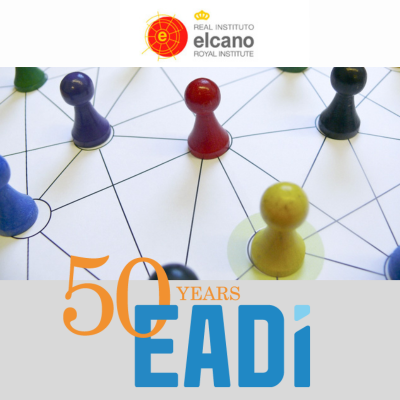Roundtable: Domestic Politics and Development Policy, Madrid, 25 April 2024
Closed-door session
The development policy of traditional donor countries in recent years has shifted significantly, from being a relatively isolated policy with a more reduced list of objectives, to becoming a strategic asset within countries’ wider foreign policy. It is now conceived more as a means for international, regional and global projection and for the generation of stronger geostrategic alliances around the globe.
This increased political interest comes at a time when the need for scaling up efforts and resources to achieve the Sustainable Development Goals is acute. The development challenges the world faces today cannot be tackled merely with traditional instruments and by traditional development actors. The involvement of new types of stakeholders and the use of innovative tools are essential to mobilise sustainable, politically and economically appealing yet socially responsible financing.
This trend, together with the proximity of the 2030 deadline for the achievement of the SDGs, the Un Summit for the Future and the upcoming Fourth Conference on Financing for Development in 2025, make this a pertinent moment to reflect on the factors that condition development policy. The volume and distribution of resources that high income countries decide to allocate to global sustainable development is partly dependent on the political and public narrative of the motives, values and interests behind it.
Objective:
The goal of this roundtable is to explore the existence, strength and functioning of the interconnections between countries’ domestic political contexts and their development policy. This is done in order to understand some of the elements that determine the levels of commitment, priorities, shifts and potential vulnerabilities of such development policy, which is in turn relevant due to the pressing needs mentioned above. This will be done through the discussion of a series of case studies to help illustrate this link.
Format, audience and agenda:
The meeting will be held in person at the Elcano Royal Institute’s premises (C/Príncipe de Vergara, 51) from 17.30 to19.00 in English and under the Chatham House rule. It will have a duration of 90 minutes.
The roundtable will gather up to 40 people. Aside from EADI’s Executive Committee, the participants will constitute a representation of policymakers, political parties’ representatives, civil society and academia.
Agenda:
Welcoming remarks - Charles Powell, Director, Elcano Royal Institute
Case studies:
- European Union – Andrew Sherriff, Associate director, ECDPM
- Germany – Sven Grimm, Head of Research Programme, IDOS
- United Kingdom – Andy Sumner, Professor, King’s College London; President, EADI
- Spain – Iliana Olivié, Senior Analyst, Elcano Royal Institute; Vice-President, EADI; Director, European Think Tanks Group
Comments by policymakers:
- Antón Leis, Director, Spanish Agency for Development Cooperation (AECID)
- Natividad Lorenzo, Deputy Head of Division, Financing Instruments and International Cooperation, Global Agenda and Multilateral Relations, European External Action Service (EEAS)
Moderation - María Santillán O’Shea, Analyst, Elcano Royal Institute.


